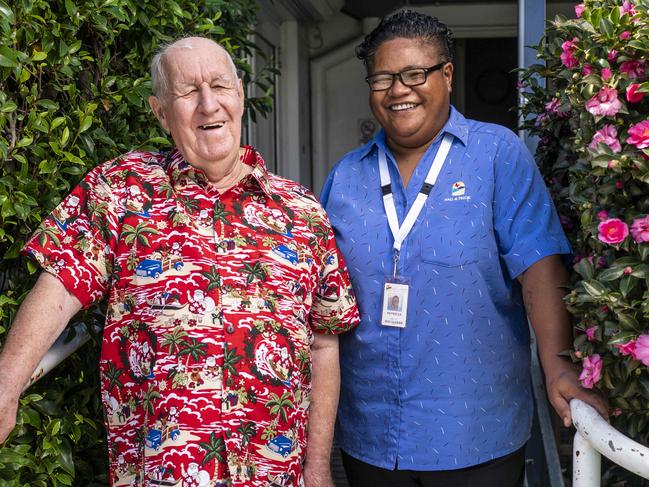5 reasons to consider a career in aged care
About a million direct care workers are expected to be needed in Australia’s aged care sector by 2050. Could you be one of them?

Careers
Don't miss out on the headlines from Careers. Followed categories will be added to My News.
THERE is massive demand for workers in the aged care sector, with staff levels set to triple within the next 30 years.
The Federal Government report, A Matter of Care: Australia’s Aged Care Workforce Strategy, predicts Australia will need almost one million direct care workers – including personal care workers, nurses, support staff and allied health professionals – by 2050.
But employers are struggling to attract suitable applicants as many Australians do not understand the career opportunities available or the day-to-day realities of the job.
So why consider a career in aged care?
IT’S NOT JUST PERSONAL CARE
Aged Care Workforce Industry Council chief executive Louise O’Neill says workers can spend their whole career in the aged care sector, doing many different roles.
“You might start as an entry-level personal care worker then become a lifestyle worker,” she says.
“You might come in via administration and end up a cook or chef.
“You might have a background in IT so look after data and IT support.
“You might be a maintenance person, or an executive, eventually.
“You might run an organisation.”
O’Neill says there is also an abundance of jobs for cleaners.
“If you are clean freak, get a job cleaning in home care,” she says.
“There is lots of fun in cleaning other people’s homes.”

THE PAY’S NOT TOO BAD
The Australian Government’s JobOutlook portal reveals a typical full-time aged and disability support worker earns $1265 a week, or about $65,800 a year.
The average full-time employed Australian, in comparison, earns $1460 a week, or about $76,000 a year.
O’Neill says pay is an issue in the sector, however, and it cannot be ignored.
“Pays are low compared to some other industries and that makes it challenging to get workers in,” she says.
“There are Fair Work claims to increase the minimum wage at the moment.
“Some organisations can pay better than others, though.”

IT’S NOT A DEPRESSING JOB
O’Neill says the biggest misconception of the aged care sector is that it is “all doom and gloom”.
“From a very young age, I experienced older people dying and death and that’s something people need to understand in that career,” she says.
“But it’s also one of the most beautiful things to do something positive for someone at the end of their life.
“There are highs and lows working in a care industry, (but) it’s a myth that it’s all dirty, ugly, horrible.”
IT’S PERFECT FOR CAREER CHANGERS
Many skills from other sectors translate to aged care.
For example, O’Neill says cruise ship workers have experience communicating with older passengers and restaurant chefs can bring their passion for food to aged care kitchens.
“A maintenance worker can bring skills in gardening or someone with skills in teaching or childcare (who has taken a career break) can come into the workforce again,” she says.
“If you have IT or administrative (backgrounds), there are lot of jobs in aged care.”

YOU CAN START WITH MINIMAL TRAINING
The Certificate III in Individual Support (Ageing), which takes about 14 weeks to complete, is considered the baseline standard qualification in Australia for personal care workers.
Other roles, such as in administration and cleaning, however, can be started without any qualification.
O’Neill says school leavers can get a taste of the industry before committing to study by approaching employers directly.
“Knock on doors of aged carer providers in your area, introduce yourself and see if you can get some volunteer work,” she says.
“Sometimes it’s worth talking to an organisation before going to TAFE and asking: What types of qualifications would I need? What are you looking for?”

Q&A WITH AN AGED CARE WORKER
Patricia Silao, assistant in nursing (AIN), Menaville Aged Care Home
WHAT’S YOUR BACKGROUND?
I have a Certificate IV in Nursing and have worked for Hall & Prior, the owners of Menaville Aged Care, for 21 years.
WHY AGED CARE?
I was very close to my grandmother and loved her so much. It helped that my mother was a nurse, which gave me strong insight into life working in the healthcare industry.
I come from a Samoan background and family is the most important thing bar none in our culture. We also look after our elderly family members at home and support one another.
WHAT’S A TYPICAL WORK DAY?
I start my day by greeting all my residents, saying good morning and asking how their night was. Then I address clinical care such as checking blood pressure, attending to wounds and dispensing medications.
I also attend resident care by offering emotional support and conversation to really connect with the person and ensure they are feeling well cared for.
I also help out other care staff as required.
BEST PART OF THE JOB?
By far, the most rewarding part is seeing the residents happy and living their best life. Working with the great people you find in aged care is also something I cherish, it makes the working day a happy one. I love it when I see our residents set themselves little goals then achieve them.
MOST CHALLENGING PART?
The hardest thing is having to say goodbye to someone that you have cared for in every aspect.
Sometimes working under pressure when there are many tasks and people that require assistance at the same time can be challenging.
Working quickly, clinically thoroughly and being emotionally supportive at the same time will keep anyone on their toes.




